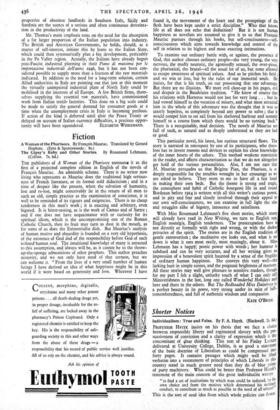Fiction
A Woman of the Pharisees. By Francois Maunac. Translated by Gerard Hopkins. (Eyre & Spottiswoode : 9s.)
The Gipsy's Baby and Other Stories. By Rosamund Lehmann. (Collins. 7s. 6d.) THE publishers of A Woman of the Pharisees announce it as the first of a projected complete edition in English of the novels of Francois Mauriac. An admirable scheme. There is no writer now living who represents as Mauriac does the traditional high serious- ness of French literature, or its formal cold didacticism ; and in a time of despair like the present, when the salvation of humanity, lost and re-lost, might conceivably lie in the return of all men to such an old, simple practice as the examination of conscience, it is well to be reminded of its rigours and exigencies. There is no cheap tenderness in this man's work ; it is exacting and arbitrary, even bigoted. It is bitter-tasting, as is the work of Camus and of Sartre ; and if one does not have acquaintance with or curiosity for its spiritual idiom, which is the uncompromising one of the Roman Catholic Church, then its fruit may turn to dust in the mouth, as for some of us does the Existentialist dish. But Mauriac's analysis of human motive and absurdity is founded on a very old hypothesis, of the existence of God and of the responsibility before God of each isolated-human soul. Tile intuitional knowledge of many is attracted to this assumption, and always will be, as it cannot be to the throw- up-the-sponge admonitions of other prophets. This author preaches austerity, and we not only have need of that sermon, but we can welcome it. " From the lives of a very small number of human beings I have derived an idea of what happiness might be in this world if it were based on generosity and love. Wherever I have found it, the movements of the lieart and the promptings of the flesh have been kept under a strict discipline." Who that knows life at all does not echo that deduction? But it is not human happiness as novelists are assumed to give it to us that Francois Mauriac pursues through his books, but self-conciousness—self- consciousness which aims towards knowledge _and control of the self in relation to its highest and most exacting intimations.
To examine our ordinary battle with, or against, the presence of God, this author chooses ordinary people—the very young, the very nervous, the madly neurotic, the agonisedly sensual, the over-pious, the pharisaical, the brutal—all the usual lot of us, but none allowed to escape awareness of spiritual values. And so he pitches his field ; and we win or lose but by the rules of our immortal souls. He insists, for that is his truth, on our possessing that one advantage. But there are no illusions. We meet evil close-up in his pages, evil and despair in the Baudelaire tradition. " He knew of course that his relations with Hortense would not last for very long . . . but he had vowed himself to the vocation of misery, and what most attracted him in the whole of this adventure was the thought that it was so utterly hopeless, so completely beyond any power to solve ; that it would compel him to set sail from his sheltered harbour and commit himself to a course from which there would be no turning back." There is a recognisable, mad decision. The novels of Mauriac are full of such, as natural and as deeply understood as they are bad or good.
This particular novel, his latest, has curious structural flaws. The story is narrated in retrospect by one of its participants, who there- fore has to invent reasons and devices to explain his close knowledge of the. inner hearts of the others. This method weakens conviction in the reader, and affects characterisation so that we do not altogether get hold of the various personalities. Also, I am not sure that M. Mauriac persuades us that Brigitte Pian, the Pharisee, is as deeply responsible for the troubles wrought in her entourage as we are asked to believe. They seem to me to have all a fair hand in making their own beds. But the theme is strong and tragic, the atmosphere and habit of Catholic bourgeois life in and round Bordeaux before 1914 is written with all this writer's curious power, and in pity and fear and closely involved through their appeal to our own self-consciousness, we can examine in full light the sins and struggles alike of bigotry, innocence and saintliness.
With Miss Rosamund Lehmann's five short stories, which many will already have read in New Writing, we turn to English sun, English nostalgia, English tenderness. The preoccupation here a not directly or formally with right and wrong, or with the darker privacies of the spirit. The stories are in the English tradition of, gentle extrovertism ; the meditative eye looks out, and what is set down is what it sees most easily, most musingly, about it. Miss Lehmann has a happS' poetic power with words ; her humour is subdued and can be very accurate, and all her writing gives an impression of a benevolent spirit haunted by a sense of the fragility of ordinary human happiness. She conveys this very well—the lurking hurt in simple scenes, and the poignant brightness of memory. All these stories may well give pleasure to sensitive_readers, though for my part I felt a slight, unlucky touch of what I can only call Miniverishness in the last, long one called Wonderful Holidays and here and there in the others. But The Redheaded Miss Daitureys is a perfect beauty in its genre, very strong under its mist of half- rememberedness, and full of authentic wisdom and compassion.
KATE O'BRIEN.


























 Previous page
Previous page